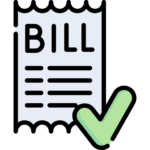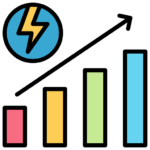The benefits of smart meters for businesses
Small businesses will automatically receive a smart meter as part of the universal rollout. However, here are three reasons you should consider requesting an early smart meter installation.
By the end of 2025, Ofgem requires energy suppliers to have installed smart meters at the properties of their business customers. Smart business energy meters benefit business owners, suppliers, and grid operators with accurate real-time energy consumption data.
Small businesses will automatically receive a smart meter as part of the universal rollout. However, here are three reasons you should consider requesting an early smart meter installation.

A smart meter will automatically transmit regular meter readings to your business energy supplier. In other words, no more manually reading the dials of each of your existing energy meters, saving you time and effort.

Suppliers estimate business energy usage to calculate monthly business energy bills without automatic meter readings. A smart meter ensures accurate billing by providing real-time usage data, preventing your business from being overcharged for business electricity prices.

With a smart meter installed, your business can participate in the Demand Flexibility Service. This scheme offers financial incentives for businesses willing to reduce electricity usage during times of peak demand on the grid.
Smart meter technology is continuously evolving. Currently, there are two main types of smart meters:
These are known as “SMETS 1” or “Smart Metering Equipment Technical Specification 1” in industry terms. First-generation meters connect to the 3G mobile network, which is fine for sending readings. The issue is that these meters can’t be used when you switch business energy suppliers.
Second-generation meters, or “SMETS 2”, represent a more advanced generation of meters. They transmit data to a centralised network operated by the Data Communications Company. This centralisation means that all business energy suppliers can access the consumption data from these meters.
The Data Communications Company is undertaking a programme to upgrade first-generation devices to second-generation smart meters.
Smart meters are the latest generation of electricity and gas meters.
They transmit real-time energy consumption data to your business energy supplier and energy monitor.
Here’s a summary of how smart business energy meters work.

Smart meters monitor the volume of electricity and gas passing through a business energy connection. Electricity meters use a current transformer sensor, while gas meters use a pulse flow sensor to measure the flow of energy through them.

Live energy usage measurements are processed by a microcontroller, which converts raw data into kWh for electricity and cubic metres for gas. The microcontroller keeps track of total consumption since the meter’s installation.

Using a secure wireless network, the smart meter securely transmits meter reading data every 30 minutes or daily (depending on configuration). The data is received by your commercial electricity or business gas supplier and local business energy monitoring devices.
Ofgem, the energy regulator, has set binding targets for energy suppliers to achieve universal smart meter coverage by the end of 2025.
The universal smart meter rollout encompasses both home energy users and businesses. The type of meter your business will receive depends on your business energy consumption.
All businesses with an electricity profile class of 03 or 04 will receive smart meters:
Your electricity profile class is the first two digits of the MPAN associated with each business electricity supply point at your property.
The simplest way to find your MPAN is by looking at a recent business energy bill.
💡 Profile classes 01 and 02 are used for domestic electricity users, who will also be equipped with smart meters.
Commercial properties with higher energy consumption (profile classes 05 – 00) should already be equipped with advanced meters that transmit half-hourly meter readings. These businesses are not affected by the universal rollout of smart meters.
This regulation, implemented in 2017 and known as P272, marked the energy industry’s first step towards automatic meter readings.
For more information on whether this regulation affects your business, see our guide to large business energy.
The primary difference between a half-hourly meter and a smart meter is that smart meters can connect to a local network used by business energy monitoring devices. Smart meters not only communicate your consumption to your business energy supplier but also provide you with access to this data.
Source: BEIS – Non-domestic smart metering policy guidance.
You may request a smart meter installation from your current business energy supplier, provided that your business meets the eligibility criteria.
An engineer is required to visit your premises for a site inspection, to install the new meter, and to ensure its correct connection. The entire process usually takes less than two hours; however, it will involve a power cut for approximately 30 minutes. Therefore, it is advisable to make the necessary arrangements.
You can request your smart meter installation from your supplier using one of the relevant links for the biggest commercial energy suppliers:
For other smaller suppliers, you can use GB Energy’s search function to find the relevant page for your supplier.
💡 No obligation: Unlike domestic energy suppliers, it’s not mandatory for business energy suppliers to provide a free energy monitoring device with a smart meter installation.
Only second-generation smart meters installed after 2018 are compatible with all business energy suppliers.
If you have a first-generation smart meter, it will continue functioning, but it may not automatically transmit readings to your supplier. In such cases, you must manually submit meter readings to avoid receiving estimated bills.
Here at AquaSwitch, we offer a business energy comparison and a business gas comparison service to help businesses switch to a cheaper tariff.
Our business energy experts answer the questions most frequently asked by small business owners about smart meters.
It’s not mandatory, and if offered an installation you may decline.
However, if your current analogue electricity and gas meter is at the end of its useful life, a business energy supplier will replace it with a smart meter.
Smart meters help business owners to better understand their energy consumption and avoid unexpected charges on their bills.
As part of the national rollout, business energy suppliers are required to offer smart meters.
Yes, second-generation smart meters are fully compatible with commercial solar panels and other forms of renewable energy for businesses. Owners of solar panels can export any unused electricity back to the grid under the Smart Export Guarantee scheme. Modern smart meters are capable of measuring both electricity imported from the mains and exported under the Smart Export Guarantee.